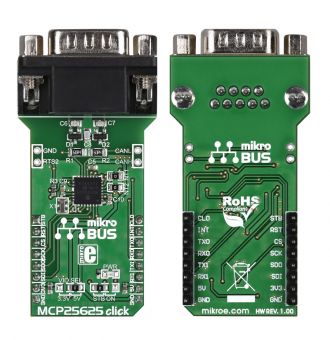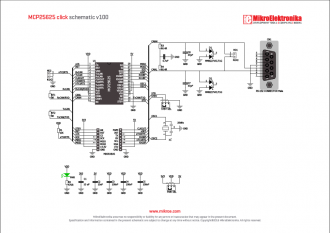
We strongly encourage users to use Package manager for sharing their code on Libstock website, because it boosts your efficiency and leaves the end user with no room for error. [more info]

Rating:
Author: MIKROE
Last Updated: 2016-09-27
Package Version: 1.0.0.0
Category: CAN
Downloaded: 2551 times
Not followed.
License: MIT license
MCP256 click is a mikroBUS add-on board carrying a Microchip CAN controller with an integrated transceiver with SPI interface. The IC meets the automotive requirement for high speed operation (up to 1 Mb/s). The board also has an RS232 port.
Do you want to subscribe in order to receive notifications regarding "MCP25625 click" changes.
Do you want to unsubscribe in order to stop receiving notifications regarding "MCP25625 click" changes.
Do you want to report abuse regarding "MCP25625 click".
| DOWNLOAD LINK | RELATED COMPILER | CONTAINS |
|---|---|---|
| 1468508508_mcp25625_click_mikroc_pic.zip [841.06KB] | mikroC PRO for PIC |
|
| 1468508479_mcp25625_click_mikroc_pic32.zip [826.65KB] | mikroC PRO for PIC32 |
|
| 1468508523_mcp25625_click_mikroc_arm.zip [841.92KB] | mikroC PRO for ARM |
|
| 1468508551_mcp25625_click_mikroc_ft90x.zip [832.82KB] | mikroC PRO for FT90x |
|

MCP25625 click is a mikroBUS add-on board carrying a Microchip CAN controller with an integrated transceiver. It meets the automotive requirement for high speed operation (up to 1 Mb/s). Named after the main chip, MCP25625 click also has a RS232 port, which is a standard connector for CAN communications. Additionally, the two CAN wires (CANL and CANH) can also be connected directly through two pins on the right edge of the board. The click communicates with the target MCU through the SPI interface — although there are additional options that take the load off the target board MCU. To that end, all 16 mikroBUS pins are connected. There’s a clock output, a Request To Send, an Interrupt, standby, reset and more. MCP25625 click can work with both 3.3V or 5V logic levels.
Key features
Key benefits
